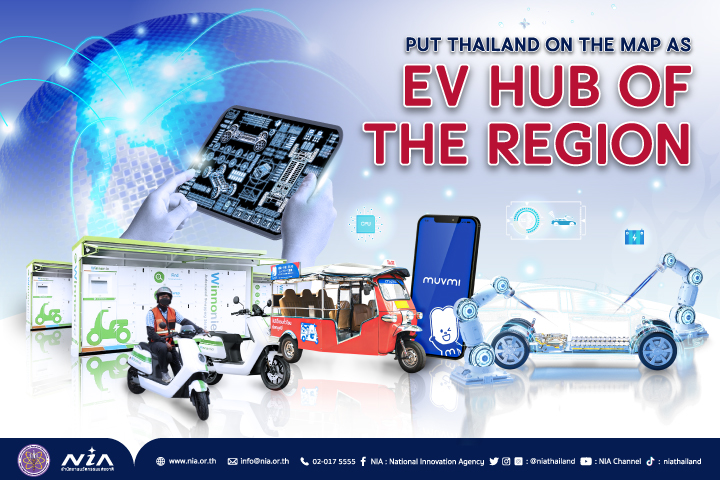- เกี่ยวกับเรา

เกี่ยวกับเรา
สำนักงานนวัตกรรมแห่งชาติ (องค์การมหาชน)
- บริการ

บริการ
การให้บริการของ NIA
- ข่าวสาร/บทความ

ข่าวสาร/บทความ
ความเคลื่อนไหวของ NIA
- ติดต่อเรา/แจ้งปัญหา

ติดต่อเรา/แจ้งปัญหา
ช่องทางในการติดต่อกับ NIA
Put Thailand on the map as EV hub of the region
23 มกราคม 2567 8,784Put Thailand on the map as EV hub of the region

This year, the spotlight is firmly on "electric vehicles" or EVs, evident in the notable increase in reservations compared to preceding years. This upsurge reflects a growing global trend of individuals prioritizing environmental consciousness in their lifestyles. Additionally, there is an observable era marked by the shift away from fossil energy toward new alternative energy sources.
This megatrend is exemplified by the continuous growth in global EV sales, escalating from 3.1 million vehicles in 2020 to 6.5 million in 2021, further reaching 10.2 million in 2022, and exceeding 14 million in 2023. It marks a historic milestone as electric vehicles, spearheaded by pioneering technology developer "Tesla," emerge as the most valuable automotive brand globally. Thailand is also actively participating in this trend. Recent findings reveal a remarkable surge in electric car registrations, soaring from 570 cars in 2019 to over 66,000 cars in 2023. Notably, at a recent well-known automobile expo, there were a staggering 53,248 car reservations, with more than 20,400 of them being for EVs.
Becoming an “EV production center" is a new opportunity that Thailand must swiftly capitalize on.
Today, the National Innovation Agency (Public Organization), or NIA, invites you to explore the growth prospects of the innovative electric vehicle industry in Thailand. Initial data indicates that Thailand stands as a pivotal global hub for automobile production. Consequently, the government has established an ambitious goal to position Thailand as a key production center for electric vehicles and automotive parts in the Asian region. Furthermore, the government has established an objective to manufacture zero emission vehicles (ZEVs), which are vehicles emitting no emissions. By 2030, the target is for zero-emission cars to constitute 30 percent of the overall car production. This commitment is embedded in the long-term planning outlined in the 13th National Economic and Social Development Plan. The plan extends beyond merely encouraging electric car production and usage; it also emphasizes the comprehensive preparation of the ecosystem for electric vehicles, focusing on promoting and advancing innovations related to electric vehicle technology.
Capitalizing on the opportunities and growth potential within the electric vehicle industry and its related technology, NIA has designated it as a key sector within the economic innovation project eligible for funding. Through the "Mandatory Innovation Business Platform," innovators in this field receive support in the form of grant funding, with a cap of 5 million baht per project. This funding encompasses various aspects such as market testing, product enhancements, standard testing, and the scaling of innovations toward commercialization. The support and acceptance of project proposals in the previous year revealed significant interest from over 100 innovation-based entrepreneurs seeking assistance. NIA is actively prepared to facilitate the creation of opportunities and establish connections with related markets, including tourism, transportation, and industries associated with electric vehicles. This underscores the comprehensive readiness and progress of these industries, extending beyond the passenger car sector.
Winnonie - a motorcycle taxi service startup aimed at saving the world, expressing the essence of the new era's motorcycle taxis that are committed to human and global well-being.
Winnonie stands as the pioneering startup in Thailand, introducing an innovative platform for electric motorcycle taxis along with a network of automated battery exchange stations. This groundbreaking initiative aims to enhance the quality of life for motorcycle taxi drivers by reducing occupational expenses. Concurrently, it tackles the necessity of promoting clean energy and actively contributes to the reduction of air pollution.
Winnonie emerged in response to the challenges faced by motorcycle taxi drivers burdened with high occupational expenses, with over 60 percent attributed to vehicle installments and petrol costs. To alleviate this financial strain and enhance income, Winnonie introduced a groundbreaking platform that offers electric motorcycle (E-Motorbike) rental services.
This initiative comprises three key technological components. Firstly, it involves the utilization of imported electric motorcycles with an engine size equivalent to a 125-cc petrol vehicle. These motorcycles are equipped with two batteries, providing a range of 80 to 100 kilometers and a maximum speed of 80 kilometers per hour. Secondly, the initiative includes ready-to-use batteries and a network of battery change stations. Thirdly, a dedicated application is introduced, offering monthly rental rates starting at 4,200 baht or approximately 140 baht per day. This monthly fee covers maintenance service charges and includes access to the Automatic Battery Swapping Station service. This eliminates the need for drivers to wait for charging and enables them to swiftly replace the battery within two minutes, resulting in a reduction of overall costs by more than 50 percent.
Since its inception, Winnonie has served over 1,000 users with its electric motorcycle platform and battery-swapping services. The ambitious plan includes expanding with an anticipated 120 battery-swapping stations covering Bangkok and its environs by the end of 2023. Looking ahead, the goal is to capture a 10 percent market share by 2026, focusing on the extensive community of motorcycle taxi drivers and riders, totaling up to 500,000 units. Additionally, the target extends to the broader population of motorcycle users, which totals approximately 4 million units in Bangkok.
If successful as intended, the project has the potential to significantly curb carbon dioxide emissions, combat global warming, and alleviate noise pollution. This aligns with both the environmental imperatives of the net-zero policy and the economic dimensions outlined in the BCG framework. In doing so, it could foster GDP growth through increased employment opportunities and the advancement of innovation, encompassing the production of battery swapping stations, associated software, and many others. These developments might extend to the production of electric motorcycles and batteries in the future. They also have the potential to enhance social aspects and overall quality of life, empowering motorcycle taxi drivers to maintain stable expenses, increase income, and adopt new technology that improves their quality of life.
"MuvMi" represents the transformation of Thailand's soft power icon "Tuk Tuk" into a vehicle designed to travel and share positive experiences with fellow travelers.
MuvMi, a Thai electric tuk-tuk, is a volunteering initiative designed to alleviate traffic congestion through cutting-edge innovation and a ride-sharing system. It introduces new travel options for residents of Bangkok that are not only economical but also safe, environmentally friendly, and free from pollution. Beyond its practical benefits, MuvMi aims to enhance Thailand's "soft power" image, leaving a positive impression on foreigners.
MuvMi represents a public transportation service in the form of "electric tuk-tuk," offering the distinct advantage of being compact and small. Its nimble design enables it to navigate through narrow alleys with ease, facilitating the efficient transport of multiple passengers on each trip. Therefore, MuvMi has evolved into an innovative electric tuk-tuk with a distinctive appearance, departing from the traditional design. Sporting a modern, airy, and comfortable aesthetic, it boasts a quiet operation, a robust structure, and a low center of gravity, minimizing the risk of overturning and ensuring high safety standards. Powered by electricity, it eliminates concerns related to odors, loud noises, and environmental pollution.
Additionally, MuvMi offers the added convenience of a dedicated 'MuvMi' application, enhancing the experience for both drivers and passengers. The app provides essential information about travel routes, battery levels, and locations of charging stations. Users can easily request a ride through the app, and fares are calculated based on the actual distance traveled. This feature addresses issues such as unpredictable fare prices, the potential for overcharging, and challenges in negotiation, particularly for foreign tourists who may not speak Thai.
Moreover, MuvMi features a ride-sharing system that allows passengers to opt for solo travel at a fixed rate or choose to share seats with others. The shared option accommodates up to 6 passengers, with fares starting as low as 10 baht per passenger. Since its initial launch in 2018, MuvMi has facilitated over 3.7 million passenger trips, operating with 350 tuk-tuks and establishing 1,000 pick-up points across 12 areas in Bangkok. With a vision for expansion, the initiative aims to increase its fleet to 1,000 vehicles and extend its services to other major cities and tourist destinations, including Chiang Mai and Phuket, in the future.
Golfdigg's innovative approach enhances the reputation of Thai golf courses, positioning them among the top 5 globally.
Golfdigg, a forward-looking startup, is utilizing technology to enhance management efficiency and elevate the quality of service in golf courses. This innovative approach serves as a compelling selling point to attract high-spending tourists globally and aims to inspire golf courses throughout Thailand to recognize the significance of sustainable energy solutions.
Having previously been involved in the golf course business provides Golfdigg with a unique perspective, allowing them to discern both the "potential" and "weaknesses" of the industry. Thai golf courses, serving as both sports and tourism hubs, draw in over 1,000,000 quality tourists annually, comprising both affluent Thai and foreign visitors. This segment represents an estimated market value of around 30,000 million baht per year. Thailand stands out as a top-five destination for golf enthusiasts globally. Surprisingly, despite over 70 percent of golfers utilizing golf carts, it's noteworthy that more than 90 percent of these carts on the courses rely on lead-acid batteries. These batteries have a limited lifespan of approximately two years, with an average replacement cost of 25,000 baht per cart each time. Furthermore, the current setup is inconvenient for users. Charging the batteries requires leaving the golf cart parked for up to 8 hours, and there's a risk of the battery running out during use without prior warning, potentially leading to safety hazards. Additionally, if charging is not supervised adequately at night, there is a high risk of fire. Moreover, the maintenance procedures are complex, adding another layer of inconvenience.
Golfdigg introduces a golf cart management system designed for efficiency and the utilization of sustainable, renewable energy. This innovative solution addresses challenges related to both batteries and overall management. By transitioning golf carts to lithium-ion NMC batteries, Golfdigg is powered by batteries that can store 50 percent more energy than their traditional counterparts. It is five times lighter and eliminates the need for prolonged parking and charging sessions, which typically last up to 8 hours. This aligns with the development of a golf cart management system, presented as an online fleet management system. This innovative platform enables real-time monitoring of golf cart status and performance, allowing for efficient planning and management. With this system in place, golf carts can be made consistently available for use.
In addition, Golfdigg is actively developing battery swapping stations. These stations not only facilitate battery charging but also incorporate a management system that intelligently selects the most suitable energy source at any given time. This system is seamlessly integrated with "GM - POWERWALL," a technology that repurposes batteries for storing excess energy, thereby extending their useful life as second-life batteries.
Golfdigg is presently in the initial phases of its project, offering golf cart services exclusively within golf courses in Thailand. However, it serves as a catalyst, sparking awareness among numerous golf courses in Thailand about the significance of sustainability. This has also led to a growing willingness among these courses to invest more in addressing this issue. Looking ahead, Golfdigg envisions expanding its innovative solutions beyond golf courses by implementing this technology on over 200,000 off-golf golf carts in Thailand and extending its reach to encompass more than 1,000,000 vehicles across Southeast Asia. Besides, there are plans to broaden the scope of development to include other types of vehicles, such as lawnmowers and agricultural tractors.
บทความที่เกี่ยวข้อง
- บริการ










